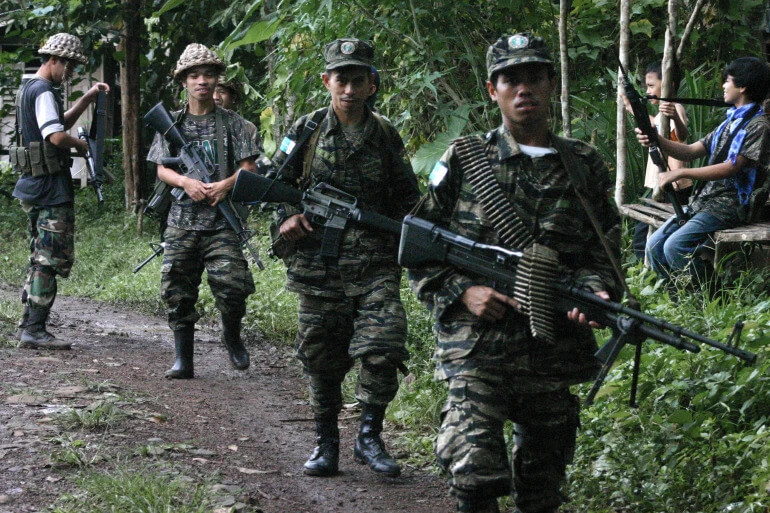Clashes between the Philippines army and the Moro Islamic Liberation Front (MILF) in the town of Ungkaya Pukan in the volatile southern province of Basilan from Tuesday to Thursday killed at least three soldiers and four rebels, while 13 others were injured.
The military said the latest clashes with the Muslim guerillas were triggered by a “miscommunication.” Earlier this week, the military reported seeing MILF rebels entering a village in Basilan, which it said is a violation of the 2014 deal. When the military approached the rebels, a MILF soldier opened fire, Philippines Brigadier General Domingo Gobway told the AFP news agency.
Following two days of sporadic fighting, the leaders of both sides called for a ceasefire and held de-escalation talks on Thursday. MILF chairman Mohagher Iqbal called for “immediate disengagement to prevent the situation from escalating.” “The MILF is firmly committed to implementing the CAB [Comprehensive Agreement on the Bangsamoro] and realising long-term peace, justice, and prosperity,” he underscored.
As part of the Peace Process in South Philippines, the public launch of the resumption of Moro Islamic Liberation Front decommissioning was held today. The decommissioning is supervised by the Independent Decommissioning Body which is chaired by Türkiye since 2014. pic.twitter.com/KUfxMnWUDk
— Turkish MFA (@MFATurkiye) September 27, 2022
The recent skirmish comes only days after a homemade bomb exploded in a bus and killed one passenger and wounded 10 others in Tacurong city in the country’s southern Sultan Kudarat province. Although no group accepted responsibility for the attack, local police blamed the Bangsamoro Islamic Freedom Fighters, a small rebel group that has carried out similar bus bombings in the past. The suspected group broke off from MILF several years ago, when the latter entered into peace negotiations with the government.
MILF, one of the largest Muslim separatist groups in the southern Philippines, signed a peace agreement with the military in 2014, as part of over 40,000 rebels agreed to lay down their arms in exchange for livelihood packages. However, their total disarmament, also known as the “decommissioning process,” is yet to materialise due to years of delay from the government.
Despite negotiating the peace deal, the MILF has complained of its laggard implementation. According to the group’s chair and interim chief minister of the Bangsamoro Autonomous Region in Muslim Mindanao (BARMM), Ahod “Al Haj Murad” Ebrahim, the slow decommissioning process is due in part to the lack of funding from Manila. In fact, the funding was outright excluded from the General Appropriations Act (GAA) this year.
Nevertheless, efforts have continued to integrate rebel forces into the country’s society. As part of these efforts, Japan has extended a $12.7 million grant to help the Philippines rebuild a vocational training centre for former MILF rebels.
Some rebels have already successfully surrendered to the government to reintegrate into mainstream society. It was reported yesterday that 17 former rebels received a Joint Armed Forces of the Philippines/Philippine National Police Intelligence Committee (JAPIC) on Thursday for completing a capacity-building programme. The certificate is a pre-requisite to receive assistance through the Enhanced Comprehensive Local Integration Program (E-CLIP), which provides livelihood, education, housing, medical, and social services assistance.
According to the International Crisis Group, the latest episode of violence between the two sides is a rare occurrence, given that they have more or less held the peace since the 2014 deal.
“We thought there would be no more fighting between the Armed Forces of the Philippines and the MILF because of the peace agreement,” Basilan representative Mujiv Hataman told local media in this regard.
Likewise, Presidential peace adviser and former military chief Carlito Galvez said, “We cannot allow this latest incident in Basilan to negate the major gains we have achieved over the years.”
Under the deal, the MILF group rescinded its demands for the five-province Muslim region to be allowed to become an independent country. Former guerilla leaders now lead the Bangsamoro Autonomous Region as part of a transition period that ends in 2025.
Violence in the region prior to its signing killed more than 100,000 people. The deal thus enjoys huge support from the West, which fears that a “lawless, Muslim-dominated” southern Philippines could turn into a haven for extremists.

